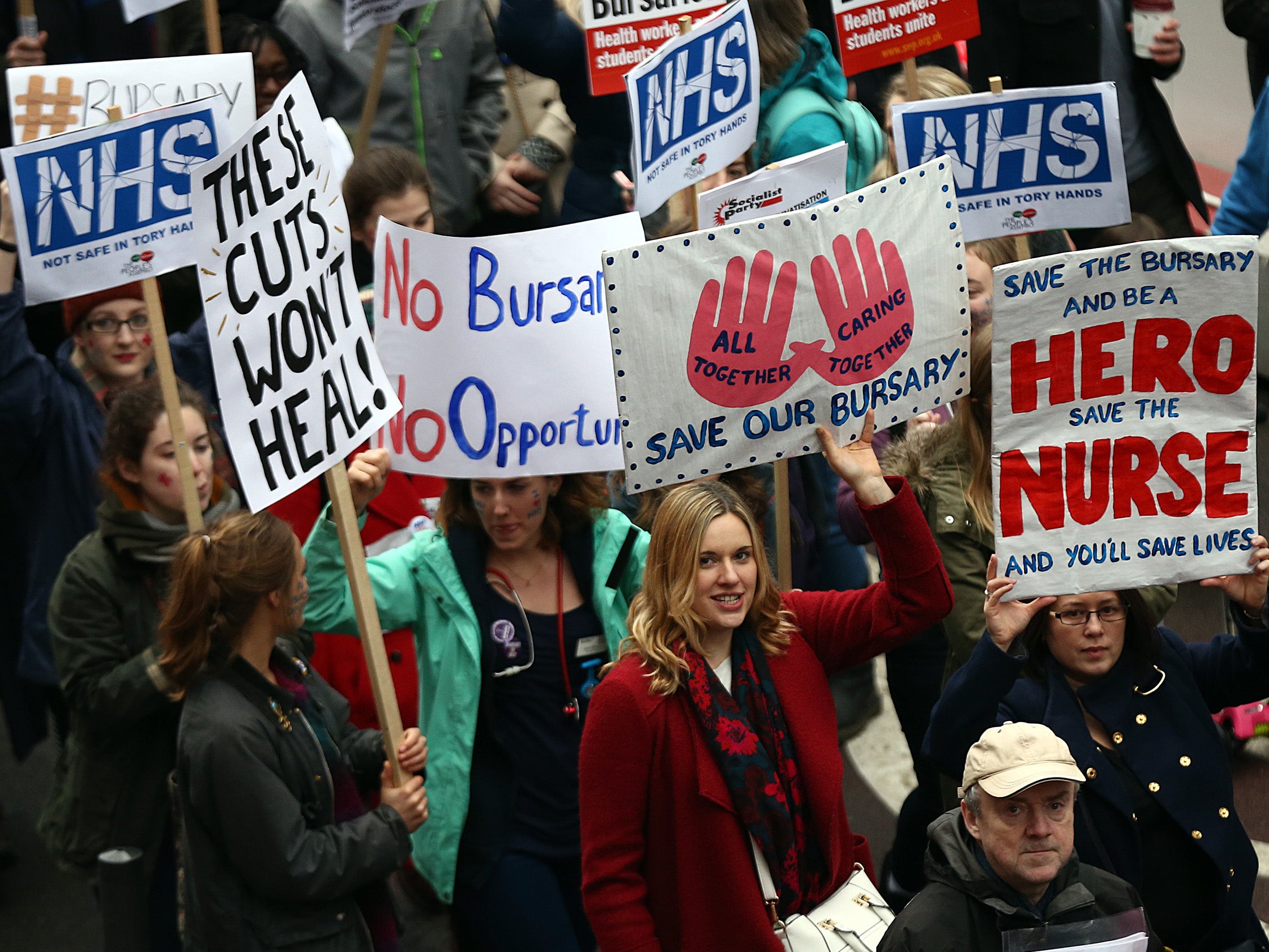Government 'quietly goes back on promise to fund 10,000 new nursing degree places', claim universities
Decision to scrap bursaries has been blamed for 23 per cent slump in nursing applications

Your support helps us to tell the story
From reproductive rights to climate change to Big Tech, The Independent is on the ground when the story is developing. Whether it's investigating the financials of Elon Musk's pro-Trump PAC or producing our latest documentary, 'The A Word', which shines a light on the American women fighting for reproductive rights, we know how important it is to parse out the facts from the messaging.
At such a critical moment in US history, we need reporters on the ground. Your donation allows us to keep sending journalists to speak to both sides of the story.
The Independent is trusted by Americans across the entire political spectrum. And unlike many other quality news outlets, we choose not to lock Americans out of our reporting and analysis with paywalls. We believe quality journalism should be available to everyone, paid for by those who can afford it.
Your support makes all the difference.The Government has been accused of going back on its promise to fund 10,000 new nursing degree places after universities said no extra places have yet been allocated or paid for.
In his 2015 Autumn Statement, George Osborne said student nurses would stop receiving bursaries and would have to take out loans to fund their courses instead.
The plans were meant to free up around £800m a year in Government spending, which would be used to remove a cap on the numbers of student nurses and create thousands of new training places.
However, universities with nursing courses have been unable to increase the number of places they offer as so far “no new money has been announced,” reported The Guardian.
The concerns come as MPs prepare to vote on lifting a public sector pay freeze that has been in place for seven years and that nurse leaders say has contributed to staffing shortages, risking patient safety.
Student nurses who started their courses last September and in previous years have had their tuition fees paid by the NHS and could apply for a bursary and grant to help with living costs, as well as accessing a reduced-rate student finance loan.
But from this upcoming academic year, they will have to borrow money to cover standard tuition fees of up to £9000 a year – a factor that has been blamed for a 23 per cent slump in applications to nursing and midwifery degree courses.
Leaders of universities with high-ranking nursing courses told The Guardian they believe Mr Osborne’s policy was never intended to expand places but was “just to save money”.
“The fact the training placements haven’t increased shows there was no plan to increase numbers,” David Green, vice-chancellor of Worcester University, told the newspaper, while Professor Steve West, vice-chancellor of the University of the West of England, said as no new money has been announced, “it isn’t clear how you fund an increase in what we currently have”.
The Department of Health said the 10,000 new places would be delivered by the end of the current parliament, adding the NHS is on track to fill the required number of places for student nurses this year.
But the Royal College of Nursing (RCN) said the NHS “cannot function on empty promises”, warning England currently faces 40,000 nursing vacancies.
“Who is going to fill those places? Where are the nurses of the future going to come from?” said Stephanie Aiken, the union’s deputy director of nursing.
“They are not coming from Europe – we’ve seen a 96 per cent drop in the number of new registrants since the Brexit vote. And it appears now the government has little intention of training extra nurses at home.
“This cannot continue. We call on the Government to make good on its promise, invest in nursing education and fund extra places – safe patient care depends on it.”
Health minister Lord O'Shaughnessy argued recent figures revealing a dramatic drop in the number of European nurses applying to work in the UK can be explained by new language tests, rather than fears over Brexit.
Labour said the Government's decision to charge full fees to students training to become health service workers "makes no sense whatsoever" and is putting would-be nurses off applying.
“The Government said they would create 10,000 extra nursing places and they have totally failed to deliver,” shadow health secretary Jonathan Ashworth told The Independent.
“They should abandon this failed policy and come back with a sustainable workforce strategy which really addresses the critical shortage of health workers in our NHS.”
Jude Diggins, 49, who has been a nurse for over 30 years and is now the RCN’s operational manager for London, attended a protest yesterday over low pay outside the Department of Health.
She told The Independent she is “really concerned” about pay and staffing levels, which she said have been affected by the removal of student bursaries.
“From every avenue, the ability to raise staffing levels to what is safe is being stymied by poor decision making,” she said.
It has been estimated to cost £15m over five years to fund 10,000 new training placements. Half of the time in each nursing degree is spent on supervised placements in a local hospital or community.
Join our commenting forum
Join thought-provoking conversations, follow other Independent readers and see their replies
Comments